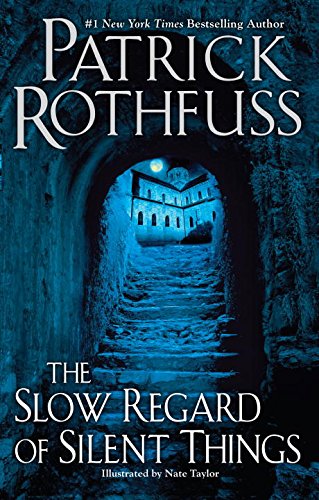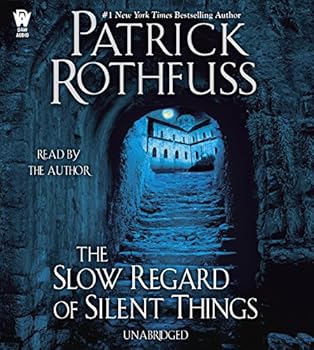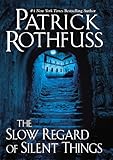 The Slow Regard of Silent Things by Patrick Rothfuss
The Slow Regard of Silent Things by Patrick Rothfuss
![]() After I read Patrick Rothfuss’s novella, The Slow Regard of Silent Things, I spent some time leisurely cleaning my house, enjoying putting things “just so.” Reading it put me in a meditative mood, the mood to organize my life and, in doing so, organize my mind.
After I read Patrick Rothfuss’s novella, The Slow Regard of Silent Things, I spent some time leisurely cleaning my house, enjoying putting things “just so.” Reading it put me in a meditative mood, the mood to organize my life and, in doing so, organize my mind.
This KINGKILLER CHRONICLE story follows Auri, the blonde urchin who befriends Kvothe in The Name of the Wind. Readers get to experience a week of Auri’s life in the Underthing, the maze of tunnels and ruins that run under the University. During this time, she forages for food, uncovers hidden objects, and prepares for the arrival, in seven days’ time, of a guest — unnamed, but suggested to be Kvothe.
In addition to reading the manuscript, I listened to Rothfuss’s narration. It was lovely to hear this in his own voice; I have spent so much time reading his books and his blog that it felt like a friend reading to me. Rothfuss’s voice is direct and engaging as he reads the author’s note, but as he begins the story, it changes gears. He reads slower, with more weight on the end of sentences and phrases, which made the novella sound almost like a bed-time story.
As Rothfuss acknowledges in his author’s note, The Slow Regard of Silent Things is not a story in traditional sense. It does not follow Freytag’s pyramid, and the closest thing to a central conflict comes in the form of Auri’s quest to find a suitable gift for her guest. But a lot of other things happen along the way, too. With its episodic, meandering format, it’s easy to see why Rothfuss questioned whether or not this story would grab readers. And he was right. “Grab” isn’t the right word for the effect this story had on me. A better word might be “entranced.”
I was entranced into believing that objects — the “silent things” of the title — had a hidden inner life of their own. Auri believes this; she treats each of the objects in her collection like a beloved elderly relative, tenderly arranging them and listening for hints that they might be happier somewhere else, or in a different position. She sees “a secret deep within the hidden heart of things,” man-made or natural, and makes it her mission to arrange the world according to its “true shape.” Is she crazy, or inspired? The story leaves this open to interpretation, while hinting that her ability to see the true shape of things is one of her magical abilities.
The Slow Regard of Silent Things provides chiaroscuro glimpses of Auri’s backstory. We learn that she was a student at the university, studying alchemy under Master Mandrag. She even had her own laboratory, now abandoned. We also get a half-second hint of a traumatic event that might have sent her spiraling to her eventual reclusive life in the Underthing.
We also see more of the world that Rothfuss created for his series. For instance, we finally learn its name: Temerant. And, as this is an Auri story, we see so much of the Underthing, although, predictably, I want more. I want a map, a glossary, a history of how entire rooms and halls ended up there. What is the story behind Wains, or Tumbrel? All we can see is through Auri’s eyes, slantwise and half-supposing.
Rothfuss’s fascination and facility with language is evident in the KINGKILLER CHRONICLE with its magical system based on the “true names” for things. Here, inside Auri’s head, it blossoms into something otherworldly. She plays with words constantly, putting her own spin even on the days of the week, re-naming them “finding day,” “turning day,” “making day,” etc. Her names for the different areas of the Underthing are equally evocative: Mantle, Sit Twice, Yellow Twelve, Clinks.
The third-person narration abounds with compound constructions:
She almost stayed there, too, all cut-string and tangle-haired and lonely as a button.
and riffs on similar sounds:
She felt tamped down. Dim. More faint. Feint. Feigned. Fain.
and even rhyme cunningly hidden in the prose:
She laughed so sweet and loud and long it sounded like a bell, a harp, a song. She went to Clinks. She washed herself. She brushed her hair. She laughed and leapt. She hurried home. She went to bed. And all alone, she smiled and slept.
 Rothfuss’s attention to language mirrors Auri’s attention to the world around her, and it could easily edge into preciousness, except for the darkness that constantly inhabits the edges of the story. I don’t know if this was Rothfuss’s intention, but I read The Slow Regard of Silent Things as a story about anxiety and depression. Auri is one of the Kingkiller fans’ favorite characters and it’s not because she’s light and lissom and a beam of fuckin’ sunshine. She has moments when she crumbles, when her grip on sanity is slipping through her fingers and she knows it and is still powerless to stop it. I felt for her; I felt the fear and despair that comes with knowing that mental illness is stalking you.
Rothfuss’s attention to language mirrors Auri’s attention to the world around her, and it could easily edge into preciousness, except for the darkness that constantly inhabits the edges of the story. I don’t know if this was Rothfuss’s intention, but I read The Slow Regard of Silent Things as a story about anxiety and depression. Auri is one of the Kingkiller fans’ favorite characters and it’s not because she’s light and lissom and a beam of fuckin’ sunshine. She has moments when she crumbles, when her grip on sanity is slipping through her fingers and she knows it and is still powerless to stop it. I felt for her; I felt the fear and despair that comes with knowing that mental illness is stalking you.
Despite the darkness, I want to live with Auri for a while, if she will let me. I imagine most of Rothfuss’s readers will feel the same way.
~Kate Lechler
![]() I admired this. However, even though it’s really short, I felt like the conceit went on too long. Auri has a beautiful way of looking at the world, but the personification of every object she encounters wore on my nerves after a while. All objects are coy, bashful, condescending, shy, eager, restless, anxious, etc. The novel is carefully and lovingly crafted (just like Auri crafts things carefully and lovingly), but I found that I only like little bits of Auri and not a 3.5 hour chunk of her.
I admired this. However, even though it’s really short, I felt like the conceit went on too long. Auri has a beautiful way of looking at the world, but the personification of every object she encounters wore on my nerves after a while. All objects are coy, bashful, condescending, shy, eager, restless, anxious, etc. The novel is carefully and lovingly crafted (just like Auri crafts things carefully and lovingly), but I found that I only like little bits of Auri and not a 3.5 hour chunk of her.
~Kat Hooper
The Kingkiller Chronicle — (2007-2014) Publisher: My name is Kvothe, pronounced nearly the same as “quothe.” Names are important as they tell you a great deal about a person. I’ve had more names than anyone has a right to. The Adem call me Maedre. Which, depending on how it’s spoken, can mean The Flame, The Thunder, or The Broken Tree. “The Flame” is obvious if you’ve ever seen me. I have red hair, bright. If I had been born a couple of hundred years ago I would probably have been burned as a demon. I keep it short but it’s unruly. When left to its own devices, it sticks up and makes me look as if I have been set afire. “The Thunder” I attribute to a strong baritone and a great deal of stage training at an early age. I’ve never thought of “The Broken Tree” as very significant. Although in retrospect, I suppose it could be considered at least partially prophetic. My first mentor called me E’lir because I was clever and I knew it. My first real lover called me Dulator because she liked the sound of it. I have been called Shadicar, Lightfinger, and Six-String. I have been called Kvothe the Bloodless, Kvothe the Arcane, and Kvothe Kingkiller. I have earned those names. Bought and paid for them. But I was brought up as Kvothe. My father once told me it meant “to know.” I have, of course, been called many other things. Most of them uncouth, although very few were unearned. I have stolen princesses back from sleeping barrow kings. I burned down the town of Trebon. I have spent the night with Felurian and left with both my sanity and my life. I was expelled from the University at a younger age than most people are allowed in. I tread paths by moonlight that others fear to speak of during day. I have talked to Gods, loved women, and written songs that make the minstrels weep. You may have heard of me. So begins the tale of Kvothe — from his childhood in a troupe of traveling players, to years spent as a near-feral orphan in a crime-riddled city, to his daringly brazen yet successful bid to enter a difficult and dangerous school of magic. In these pages you will come to know Kvothe as a notorious magician, an accomplished thief, a masterful musician, and an infamous assassin. But The Name of the Wind is so much more — for the story it tells reveals the truth behind Kvothe’s legend.
Related novella:







I can’t wait to listen to this. Thanks, Kate!